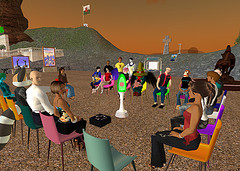I just finished taking a really stellar course in Gender and Leadership as part of my MBA studies at the Simmons School of Management. I wish I could spend a few hours unpacking all the different issues and ideas raised by this class -- at least for my own reference later -- but alas, I am still in an accellerated MBA program, which leaves practically zero time for pauses, nevermind for reflection.
Voice Mail Archives
Past editions of Voice Mail, Beth Dunn's newsletter on writing and voice.
opting in and project-based work

What is the most important function of a museum?
via the New Curator:
new study: more colleges using social media for recruiting & research

Dr. Nora Barnes gave me a heads up last night on the findings from her research on the growing use of social media by colleges and universities to recruit and research new applicants.
I met Dr. Barnes at the Society for New Communications Research Symposium in November, where she delivered the keynote address. The full findings of the report will be published in the Journal of New Communications Research, but the executive summary offers a nice look ahead.
What I found particularly striking was the growing use in higher ed of social media as a research tool, rather than as a form of outreach. In other words, while colleges and universities have for some time been reaching out to prospective applicants through social media (especially blogs), they are now increasingly using social media to get a finer-grained level of detail about applicants -- especially those applying to highly competitive programs or scholarships.
The percentage that use "search engines" is higher (23%) than those who use "social media" (17%), but I imagine that that is mostly because "search engines" are the only way most people know how to search for blogs, facebook pages, YouTube videos, etc. I suspect that entering a prospective applicant (at the final round level -- schools aren't screening every student) into Google and scanning the first few pages is considered basic due diligence at this point.
At least I hope it is.
And I am going to bet that use of these tools will be higher still a year, two years from now.
So how will this change things, as more students become more educated about exactly who is looking at their online words and behaviors?
Just as the appearance of parents on Facebook changed how that tool is used by young people, the use of social media by colleges and universities will change it again.
I think it's true that many students will do some purging and excising of their online content. But I also believe that many are already very savvy about their use of public social media, and about the way they present themselves there. Ambitious, college-bound students are already using their blogs and YouTube channels as ways to further distinguish themselves. They know these are online resumes of sorts. These students will be more relieved than startled that colleges will be reading their blogs, much like a PR person is glad when someone actually reads their press releases.
I wonder if schools will also modify their expectations of online behavior, and recognize that some lightheartedness is appropriate to the setting. (Of course offensive behavior and inappropriate posting will always be taken into consideration when evaluating students.)
But observers are themselves changed when they spend any amount of time in a different culture.
Perhaps the question is not, "How will this change how people use social media?" but "How will social media change college admissions?" And what impact will that have?
The full executive summary of the study is available here for download.
Check out the Society for New Communications Research’s Journal of New Communications Research for the full paper. Dr. Barnes will also present the findings through an upcoming webinar, and at the SNCR annual conference.
adaptive arts organisms; reflections on the Ragsdale keynote

this living hand; thoughts on what I owe my grandmother, and your children
This Living Hand
trust, twitter, and those holiday travel blues

I have always loved airports, and flying. The whole experience is still glamorous and exciting to me.
Of course, I never travel on the holidays. This might explain a lot.
This morning I read this post by an MIT student about her frustrations with an unnamed airline as she struggled to get home for the holidays. She starts off by asking her airline's CEO:
Have you ever ridden on an airplane? During the Holiday Season? Without your Super-Sparkly-Platinum member's benefits? Incognito, so that your employees don't know that they need to behave around you? Might I make a small suggestion? DO. Then go back to your interviews and repeat, "We need to take excellent care of our customer," and MEAN it this time.
Here's a sample of the contradictory information the MIT student got during her ordeal:
"We'll arrive in time for your delayed connection."
"Though you sprinted through the airport and made the connection, we decided to give your seat away."
"You definitely have a seat on the next flight."
"The next flight has been canceled. Since before you spoke with the last agent. There is no hope for you."
"Oh, you can standby on another airline. Let me transfer that ticket."
"What? They say we haven't transferred the ticket? Well, that's because we aren't allowed to. No, it's not possible. I don't care if they say it needs to be done. I don't care if the other employee told you she did it. You have issues with communication."
No, I'm sorry, you, the airline have issues with communication. And with trust. What happens after we, the customer, receive a few contradictory messages like this is that we lose faith in anything anyone wearing that company badge tells us.
But Twitter is built on trust -- that's why we insist on talking to real people we can call by name, even if you are representing a brand.
When I tweeted @comcastcares (who I know from his profile information is actually Frank Eliason) that my service was out after the last snowstorm, he told me something different (and, it happened, much better) from what the guy on the Comcast 1-800 number had told me minutes before.
Who did I trust? Frank. Who turned out to have been right? Frank.
Turns out, @JetBlue and @SouthweastAir use Twitter. How do they manage their customers' trust on Twitter?
The first thing I noticed is that both of these companies publish and (if necessary) change the name of the person on the profile who is staffing the account at any given time (see "currently on duty"):
This is really important, because Twitter works best when the interaction is personal, real, and human. In fact, it's the only way it works at all. We need a name, if we're going to trust.
So what does this do? How does this help? Is the only thing accomplished here adding another channel of information to a subset of customers who use Twitter?
No, because the secret ingredient is trust. The thing that Twitter does is it archives and makes visible your conversations with other customers over time. So if I want to talk to Jet Blue, I check out their Twitter profile to see what kind of conversations they tend to have with people. How human are they? Are they funny? Helpful? When was the last time they tweeted?
Based on the answers, I can decide the level of trust I have for them. This kind of archived conversation isn't available anywhere else, except maybe on some forums and bulletin boards, which don't offer the same immediacy, nor are they as public as Twitter. I can't go through transcripts of customer service phone conversations to see how well they do with that channel. But I can watch how you behave, publicly, over time, on Twitter. And that builds trust.
A new report just released from the Society for New Communications Research confirms the link between brand management and customer care.
Among the findings, when a customer is considering a purchase:
- 72% use social media to learn about the level of customer care offered by a company
- 74% make their purchase decisions based on the customer care information they find online.
On Twitter you can:
- Respond immediately when a customer mentions your company, your competitor, your product, or your industry
- Make the customer feel like the the company hears them and is responsive to their needs
- Find out valuable information about what your customer experience is really like (and respond accordingly, one hopes)
The SNCR report also found that only 30% of customers believe that companies take their customers' opinions seriously.
That's atrocious.
How do you use Twitter when you're having problems with a company? Do you trust what someone from a company on Twitter tells you more than what they tell you through another channel? What can companies do better to earn your trust?
ha! we're back.
Member that time? That I said I was going to go back to school? Part-time?
twitter honor roll
Liz Strauss just published a generous, helpful, and useful post (those adjectives tend to follow Liz around wherever she goes, if you haven't noticed), celebrating the behaviors she admires on Twitter, and the people she admires for embodying those behaviors.
inbound marketing FTW
[youtube=http://www.youtube.com/watch?v=4-lGe5MnBlY]
.png?width=500&height=500&name=bd%20(3).png)